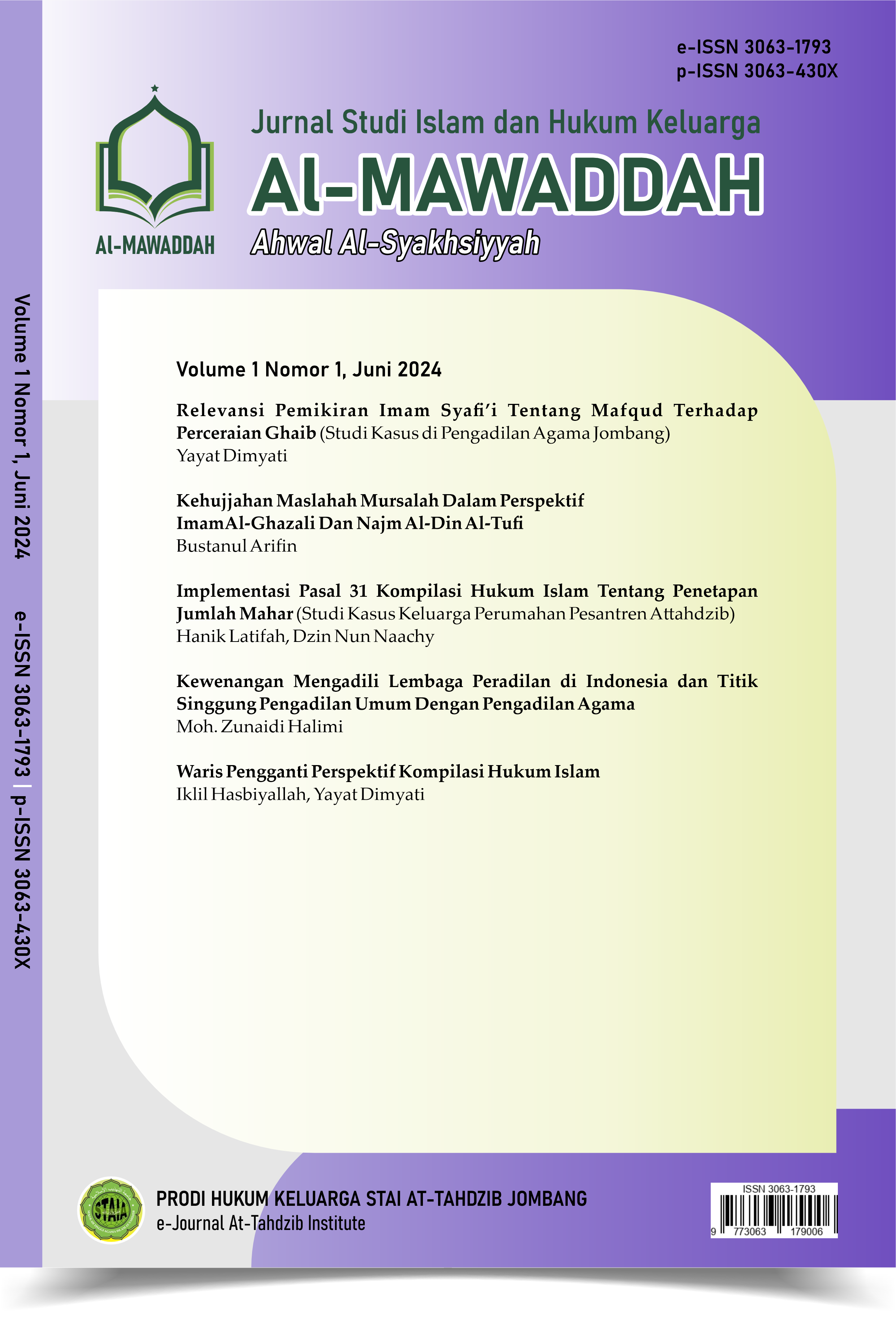Relevansi Pemikiran Imam Syafi’i Tentang Mafqud Terhadap Perceraian Ghaib
(Studi Kasus di Pengadilan Agama Jombang)
DOI:
https://doi.org/10.61181/al-mawaddah.v1i1.398Keywords:
Imam Shafi'i's, Judge's verdict, Mafqud, Occult divorceAbstract
In the mind of Imam Shafi'i there are those who argue that if the husband or wife who mafqud must wait for four years. and according to the Law and Compilation of Islamic Law is to wait with a period of 2 years. The period between these two opinions is very long if compared. This is because the sophisticated transportation and information systems present in the modern era provide a quick opportunity to find out the existence of the mafqud. Unlike the past who still do not know the transportation and information system. So here see which is more relevant to follow between the thoughts of Imam Shafi'i or the Law and Compilation of Islamic Law. In this thesis examines the Relevance of Imam Shafi'i's Thoughts on Mafqud Against Divorce Ghaib Case Study in Jombang Religious Court. This research aims to find out the opinion of Imam Shafi'i about mafqud and the ruling of the Jombang Religious Court regarding mafqud divorce. In this study, the authors used descriptive research methods that seek to describe and analyze problems in as much detail as possible. The type of research used is library research by tracing theories contained in libraries and fields. The results showed that there is no one proposition of the Qur'an and hadith that mentions the deadline for the determination of the time of missing persons, which there is only the opinion of a friend, Umar bin Al-Khatab. But Umar's opinion was only for wives who lost husbands. In addition, it can also be known the consequences of mafqud that can occur to people around or his heirs and he becomes a demand to solve it. Based on the study of the authors conducted, in this study it can be concluded that the Author hopes that ijtihad is carried out by mujtahids at any time such as judges. Because the law is dynamic will change over time following the changing era of times.
References
Abdul Rahman Ghozali. 2010. Fiqih Munakahat. Jakarta: Kencana Prenada Media.
Abu Daud, Imam, Sunan Abu Daud
Abu Zaid, Faruk. 1986. Hukum Islam antara Tradisional dan Modernis, Jakarta: Bulan Bintang.
Adi, Rianto. 2004. Metodologi Penelitian Sosial dan Hukum. Jakarta: Granit, 2004.
Ali Al-sarthawi, Mahmud, Sarah Qanun al-ahwal Asyakshiyyah, Bairut: Dar Fikr, t.th)
Ali as-Sabhuni, Muhammad. 1992 . Hukum Waris dalam Syariat Islam cet II. Bandung: Diponegoro.
Al-Jaziri, Abdurahman, Kitab Al-Fiqh ala Al-Mazahib Al-arba’ah, (Bairut: Dar al-kutub al-ilmiyah, tth), jus IV
Al-qur’an tajwid kode transliterasi perkata, terjemah perkata, Cipta Bangsa Segara, Bekasi, 2013
Al-zuhaili, Wahbah, Fiqh Al-Islam qa Adillatu, (Bairut: Dar Fakr t, th), juz 6
Amirul Nuruddin dan Azhari Akmal Tarigan. 2004. Hukum Perdata Islam Study Kritis Perkembangan Hukum Islam Dari Fikih UU no 1/1974 sampai KHI . Jakarta: Prenada Media.
Asy-Syurbasi, Ahmad. 1993. Sejarah dan Biografi Imam Empat Madzhab, Jakarta: Bumi Aksara.
Aziz, Sarip, Status Hukum Perkawinan Perempuan pada Saat Suami Mafqud. Universitas Islam Negeri Walisongo
Badan Pusat Statistik, http/www.bps.go.id/Link Table Dinamis/View/id/893
Bisri, Hasan, Peradilan Agama di Indonesia
Chalil, Moenawar. 1996. Biografi Serangkai Empat Imam Mazhab. Jakarta: Bulan Bintang.
Departemen Agama R.I. Direktorat Jenderal Pembinaan Kelembagaan Agama Islam, Komplikasi Hukum Islam di Indonesia, (Jakarta, 2000)
Departemen Agama RI, Kompilasi Hukum Islam, (Jakarta: Kompilasi Direktorat Jenderal Pembinaan Kelembagaan Agama Islam, 2001)
Direktori Putusan Mahkamah Agung Republik Indonesia, Nomor: 1888/pdt.G/2020/PA.jbg dan wawancara pribadi dengan bapak Dulloh selaku panitera pengadilan Agama Jombang
Direktori Putusan Mahkamah Agung Republik Indonesia, Nomor: 1958/pdt.G/2020PA.jbg dan wawancara pribadi denga bapak Dulloh selaku panitera pengadilan Agama Jombang
Ghofur Anshori, Abdul. 2006. Peradilan Agama di Indonesia Pasca Undang-Undang Nomor 3. (Sejarah Kedudukan dan Kewenangan)
Ghofur Anshori, Abdul. 2011. Hukum Perkawinan Islam (Perspektif Fikih dan Hukum Positif. Yogyakarta: UII Press.
Hasanah, Uswatun. 2018. Proses Penyelesaian Perkara Cerai Ghaib di Pengadilan Agama”, Jakarta : Rajawali Press.
Downloads
Published
Issue
Section
License
Copyright (c) 2024 Yayat Dimyati

This work is licensed under a Creative Commons Attribution-ShareAlike 4.0 International License.




